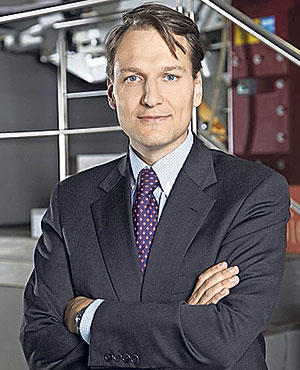Hungary’s paper tiger grew using innovation with hard, honest work
Roula Khalaf, Editor of the FT, selects her favourite stories in this weekly newsletter.
Negotiating the cobbled lanes between ageing, brick buildings on the sprawling industrial estate of the Dunapack factory in Csepel, south Budapest, conjures up images of a former era: one almost expects to meet a workers’ brigade, marching proudly to show solidarity with the proletarian cause. Not for nothing was this district of the Hungarian capital once known as Red Csepel.
But any former comrades peering into those industrial units today would be in for a shock. In the largest, a state-of-the-art, 100m-long computer-controlled production line turns three broad layers of paper into lightweight, corrugated cardboard at a rate of four metres per second. And it employs just nine men per shift. “We are the largest suppliers of packaging to the big multinationals, like Mars, Henkel in Hungary. This means we always have to offer the highest quality,” Ferenc Kohl, head of design at Dunapack, says over the whine of machinery.
Though rarely in the spotlight, Hungary’s paper and packaging sector is emblematic of the upheavals in traditional industries since the demise of communism.
In 1989, the country had more than half a dozen paper mills, all overstaffed, inefficient and largely dependent on cheap pulp and energy from the Soviet Union.
In the ensuing 25 years all but one has closed. What remains has been transformed and renewed, the driver being the Prinzhorn Group, an Austrian family-owned paper and packaging specialist that bought a minority stake in the state-owned Dunapack in 1990.
Since then it has invested €600m in Hungary to establish what Cord Prinzhorn, the chief executive, says is “a technology leader in paper and lightweight packaging . . . we are the benchmark in terms of competitiveness [in the sector]”.
Prinzhorn has three Hungarian operations: Duparec, a recycling company, which supplies Hamburger Hungaria, a paper mill whose business is based on recycled paper, which in turn supplies Dunapack.
These three constitute the largest country operation in the group, larger, even than the Austrian parent.
“In total, we have 5,335 people in 13 countries, out of which 1,260 are in Hungary, or 24 per cent of our workforce,” Mr Prinzhorn says.
But Hungary accounts for €420m, or 35 per cent of the group’s €1.2bn total turnover owing to a combination of strong investment and a skilled workforce, Mr Prinzhorn says.

“Paper and packaging has a lot of competence in Hungary, mainly because we have kept it here. Had we not invested in the 1990s, this competence would have probably been lost,” he says. He believes the Hungarian operation is a benchmark. “Within recycling, paper manufacturing and high-quality packaging, we achieve the highest utilisation and efficiency of our resources — above 93 per cent — where the competition average is below 88 per cent,” he says. “It’s not just technology, it’s our organisation, knowledge and dedication.”
After establishing its Hungarian base, the group employed skills developed there in neighbouring states, using the country as a hub to roll out investments — chiefly packaging plants — into Romania, Croatia, Serbia, Bulgaria and, most recently, Ukraine.
All told, investment in the region, including Turkey, totals €1.1bn, driven by international clients expanding their operations and requesting services as they developed, Mr Prinzhorn says. Group revenues are expected to grow by about 5 per cent this year.
While aesthetic design and a fine finish to packaging are high priorities, Mr Prinzhorn takes great satisfaction in the bottom-line, utilitarian value of high-quality packaging.
“This summer, I was in Ukraine. You used to have watermelons thrown into a truck one by one. It took two hours to load and, since the roads are miserable, 30 per cent were smashed,” he says.
Now, with the Prinzhorn plant producing affordable, disposable cardboard crates, farmers can load a truck with a forklift in 15 minutes and deliver with minimal loss.
“We opened our [Ukraine] plant in 2012, and suddenly our products are a promoter of economic growth. I am thoroughly excited by those guys down there,” he says.
Back in Hungary, there are problems, however, Mr Prinzhorn admits, such as the loss of used paper into cheap landfill sites.
“If there is anything I wish for, it is that landfill becomes more expensive, to make sure no paper is buried and we have the chance to recycle it,” he says.
“We are profitable, and we should be, we are entrepreneurs, and we invest,” Mr Prinzhorn says.
“There is a reason why we [in paper] are not considered sexy. It’s hard, honest work,” he adds.
Comments